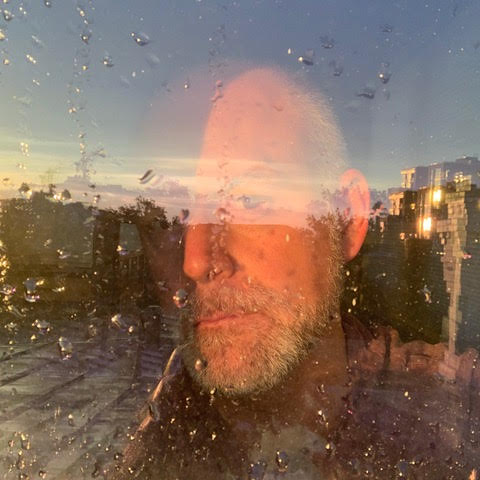I’m so excited to welcome one of my very dearest friends to the site today. John and I met a very long time ago in grad school at George Mason University and became insta-friends. It helped that we admired each other’s writing and that we each had a love for creepy things. Our writing styles are very different, but we did take a somewhat similar path by both starting out in a very literary MFA program and then veering back to our childhood love of crime and mystery.
John’s debut, Dodging and Burning, is excellent and was nominated for nearly all the awards for a good reason. John himself is pretty excellent, too. Read on for more about his deepest, darkest fears.
What is your earliest childhood memory of fear? Or the scariest thing you remember from childhood?
When I was a child, I was obsessed with the paranormal. I lost my father to lung cancer when I was eight, so you’d think that was the reason, but I have memories of being enthralled with ghosts well before his death or the onset of his illness. Fascination with the unknown—that morbid curiosity—has always been with me. I remember seeing ghosts as a kid. I’m certain now that I summoned them from my imagination after hours of staring at the Time-Life books series Mysteries of the Unknown, but what scares me is that, as a child, I really thought I saw a black shadow gathering density and shifting in the corner of my bedroom, or an old decaying farmer walk into my room and sit on my legs in the middle of the night. I mean, I just imagined it, right?
Do you believe in ghosts? Why or why not?
Hmmm. I love this question, and I have complex answer: I believe there’s a lot about the human experience that’s beyond understanding. One of those things is how we perceive time. In a physical sense we experience life linearly, but in an emotional sense we don’t. Our perception is always a mingling of past experience and present sensation. I also don’t think emotional energy is always neatly contained in the borders of our mind and body. In other words, a place can have that sort of energy, which is also not linear. Sometimes our perception and the energy of a place overlap and you feel or even see the past. So, ghosts are the intersection of personal experience and the emotional history of a place.

“Ghosts are the intersection of personal experience and the emotional history of a place.”
What scares you most about the writing process?
Not having deadlines. For some reason, I’ve found myself in situation where I’ve been given lots of time, but sometimes I need a clear deadline or I begin to worry sentences, punctuation, etc. to death. Not enough time is a struggle, but too much time can be worse.
What’s the scariest book you’ve ever read? Is there a particular scene that really haunts you still?
Shirley Jackson’s The Haunting of Hill House because it’s less about actual ghosts and more about the overlap of the main character’s (Eleanor Vance’s) unstable perception and the emotional energy of a dark and unsettling place (See my thoughts above about ghosts). Also, Jackson’s clean and brilliant prose style is wonderfully intimidating. The opening haunts me because is so elegantly captures the true horror of the book: “No live organism can continue for long to exist sanely under conditions of absolute reality; even larks and katydids are supposed, by some, to dream. Hill House, not sane, stood by itself against the hills, holding darkness within; it had stood so for eighty years and might stand for eighty more.” It gets under your skin immediately and warns you that this book is not just about ghosts, but about insanity. By the end of the book, you don’t know where Eleanor’s insanity ends and the house’s insanity begins.
What is your favorite monster/villain?
Cruella de Vil. Such the fashionista. Also, in a similar vein, Eleanor Shaw Eselin, played deliciously by Angela Lansbury in the 1962 version of The Manchurian Candidate. The haughty female villains have such flair. They’re at once detestable and totally fabulous.
Do you have any horror movie deal-breakers?
I LOVE horror movies of all kinds. I seem to be able to tolerate B-level horror better than B-level films in other genres. That being said, I don’t like torture scenes—that’s true of thrillers, too. It seems like an easy (and cheap) way to elicit fear. If there’s a good reason in terms of the plot or character development, I’ll put up with it. If it feels really exploitative, I’ll turn it off. Also, for similar reasons, I don’t like prolonged birthing scenes where we have writhing and groaning on bloody bedsheets. It’s at once mundane and icky. However, I’m all in for surprise birthing scenes, like in Alien.
What’s worse: being haunted by a demon or having a stalker?
A stalker. Humans are always scarier than demons. Always.
John Copenhaver’s historical crime novel, Dodging and Burning, won the 2019 Macavity Award for Best First Mystery Novel and garnered Anthony, Strand Critics, Barry, and Lambda Literary Award nominations. Copenhaver writes a crime fiction review column for Lambda Literary called “Blacklight,” and he is the six-time recipient of Artist Fellowships from the D.C. Commission on the Arts and Humanities. He’s a Larry Neal awardee, and his work has appeared in CrimeReads, Electric Lit, Glitterwolf, PANK, New York Journal of Books, Washington Independent Review of Books, and others. He has taught high school English for nearly twenty years. He grew up in the mountains of southwestern Virginia and currently lives in Richmond, VA, with his husband, artist Jeffery Paul (Herrity).

